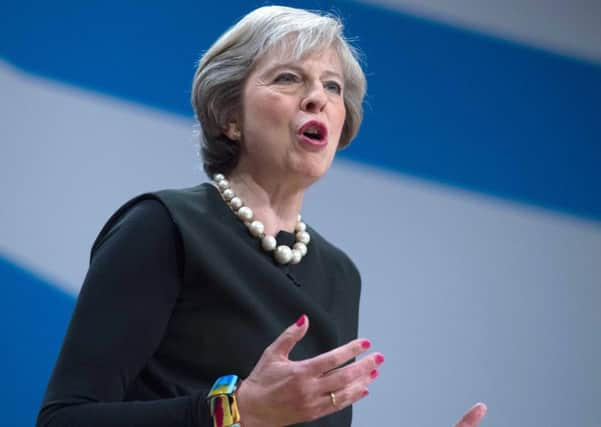Markets in for prolonged period of uncertainty as UK heads for Brexit


The value of the pound plunged to a 31-year low against the dollar, with investors being spooked by a series of announcements at the Conservative Party conference as Britain prepares to leave the European Union.
Jonathan Oxley, chairman of the Institute of Directors (IoD) in Yorkshire, said: “Markets always react skittishly to uncertainty and it’s likely that exchange rates will remain on the low side of volatile as we get closer to Brexit.”
Advertisement
Hide AdAdvertisement
Hide AdMr Oxley said that it seemed “highly unlikely” that details of any Brexit deal would be known any time soon.
“We can therefore expect a prolonged period of uncertainty and consequently, in all probability, the pound remaining at a very low level against other currencies,” he added.
Prime Minister Theresa May suggested that regaining control of immigration would take priority ahead of access to the single market. The PM also said the two-year process of negotiating Brexit under Article 50 would start by the end of March.
Although the value of sterling has fallen, Mrs May said that overall some of the economic data over the past few months has been more positive than people expected.
Advertisement
Hide AdAdvertisement
Hide AdIain Clacher, an associate professor at Leeds University Business School, told The Yorkshire Post that the pound hitting a 31-year low was a “mixed bag”.
The lower value of the pound being a “short-term boon” for exporters, who could see an uptick in orders as everything in made in the UK becomes cheaper.
“However, a weak currency is double-edged,” Mr Clacher warned.
“A weak currency signals that there is lower demand for sterling relative to other currencies such as the dollar, and this means that investors are seeing some risks to the UK economy coming down the line,” he said.
Advertisement
Hide AdAdvertisement
Hide AdWhile exports are likely to get a boost from the weaker sterling, importing goods is likely to become more expensive, which could potentially lead to price increases on the high street.
Mr Clacher said: “If you are importing goods from Europe or America for example, then these goods just got a whole lot more expensive.
“As this works through, then this will have to result in either businesses cutting their margins and being less profitable or prices on the high street increasing.”
Professor Prithwiraj Nath, associate director of The Retail Institute at Leeds Beckett University, says that if downward pressure on the pound continues until 2019 and beyond, then it will cause “severe damage to consumer confidence and buying power”.
Advertisement
Hide AdAdvertisement
Hide AdHowever, Professor Nath added that the higher costs of importing could see retailers restructuring and changing their business strategies. Retailers maybe forced to manufacture and buy more locally, he said.
“This might offset the damages caused by the weaker pound and give a boost to the economy and overall spending power of consumers. However, these are long term calls,” added Professor Nath.
Mr Oxley said there has been a wave of merger and acquisition activity as European firms look to shore up their presence in the UK by acquiring British businesses.
“This is perhaps to ensure that their position is protected in the UK market however the Brexit process unfolds, but also reflects some opportunism given the great value that corporate assets in this country represent given the fall in the value of the pound,” he added.
Advertisement
Hide AdAdvertisement
Hide AdThe FTSE 100 index rose above the 7,000-point level for the first time since May 2015 yesterday while the FTSE 250 hit an all-time high.
The fall in the value of the pound means higher sales and earnings for London-listed firms with an overseas focus when they are translated back into sterling.
James Andrews, head of investment management at Leeds-based stockbroker Redmayne-Bentley, said: “The FTSE 100 is no longer a gauge of the UK economy, given it is full of large multi-national companies, but the more domestic-focussed FTSE 250 is also touching all-time highs.”